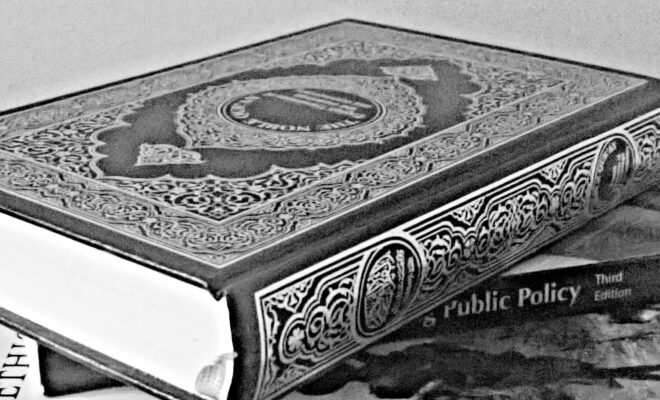Prophet Yusuf (AS): Being Patient in the Face of Trials

Allah (swt) revealed the Quran to His beloved Messenger Muhammad (saw) to guide mankind out of disbelief, ignorance and misguidance. Allah (swt) says:
“(This is) a Book which We have revealed unto you (O Muhammad) in order that you might lead mankind out of the darkness (of disbelief) into the light (of belief in the Oneness of Allah) by their Lord’s Leave to the Path of the All-Mighty, the Owner of all Praise.” [TMQ 14:1]
The Kitab (Book) of Allah is full of stories of previous Prophets (may Allah’s (swt) peace and blessings be upon them all). The diverse range of stories are narrated with details of how the Prophets (as) dealt with the challenges they faced. One such Prophet is Yusuf (as) who lived a tremendously weighty story, that is narrated to the Ummah of Muhammad (saw) through the Quran.
The story is filled with valuable lessons and we will explore some of them in this article, insha’Allah.
Purpose and Relevance of Prophetic Stories
Before we ponder on the life of Yusuf (as), it is vital to understand and appreciate the purpose of such narrations in the Quran. Prophetic stories are not mere fairytales or entertainment. Indeed, failure to properly grasp the purpose of such stories would lead us astray.
Allah (swt) narrated the events which took place thousands of years ago to RasulAllah (saw) so that we, as the last Ummah brought forth to mankind, may draw lessons from them.
None of us, including RasulAllah (saw), could have possibly learnt the story of Yusuf (as) had Allah (swt) not narrated it to us. Allah (swt) says:
“This is of the news of the Ghaib (unseen) which We reveal by Inspiration to you (O Muhammad)”.
[TMQ 12:102]
Such revelations transmit lessons and reminders for the Ummah so that we remain on the path of haqq (truth) and avoid the mistakes of the past nations. Allah (swt) says:
“Indeed, in their stories, there is a lesson for men of understanding. It (the Quran) is not a forged statement but a confirmation of Allah’s existing Books which were before it and a detailed explanation of everything and a guide and a Mercy for the people who believe.” [TMQ 12:111]
These stories are highly relevant to our 21st century life when, except for changes in technology and science, the essence of human life remains the same. Human beings still have the same problems that they have always had: seeking one’s livelihood, establishing families and engaging in acts of worship. However, the challenge is – and has always been – to address these problems in the correct way.
And the only correct way is the path prescribed by Allah (swt) – since He is the Creator of all that exists and hence knows what is best for us. Therefore, Prophetic stories are relevant today because the struggle we face today is similar to what the Prophets (as) faced before us.
The Prophethood of Yusuf (as)
The account of the life of Yusuf (as) in the Quran is one of the most detailed and fascinating stories of all. It illustrates the qualities that lead a person to success in this life and in the hereafter, whilst demonstrating the characteristics that lead them to their failure in this life and the hereafter.
As Imam Ibn Kathir (rh) mentioned in his book, Stories of the Prophets, it is a story “involving both human weaknesses such as jealousy, hatred, pride, passion, deception, intrigue, cruelty, terror as well as noble qualities such as patience, loyalty, bravery, nobility and compassion”.
Yusuf’s (as) lineage consists of Prophets; he was the son of Prophet Ya’qub (as), his grandfather was Prophet Ishaq (as) and his great grandfather was Prophet Ibrahim (as). Thus, it came as no surprise to his father when it became apparent that Yusuf (as) was destined to receive divine revelation. The story of Yusuf (as) begins with the glad tidings of his prophethood, then develops into a series of trials and ends with him prevailing over life challenges.
The Plot to Exile Yusuf (as)
Yusuf (as), who was the most beloved son of his father, dreamt that eleven stars, the sun, and the moon were all prostrating before him. He narrated this dream to his father the next morning, whereupon Ya’qub (as) realized that this was a vision from Allah (swt) and an indication of Yusuf’s (as) future prophethood. Ya’qub (as) warned his son not to disclose this vision to his brothers, for he feared that it would cause further jealousy amongst them.
Yusuf’s (as) brothers were resentful of their father’s love for Yusuf (as). So, they plotted his demise by inviting him to go out with them and threw him down a deep well. The brothers then lied to their father claiming that Yusuf (as) was eaten by a wolf, presenting his blood-soaked shirt as evidence.
Upon receiving this tragic news about his most beloved son, Ya’qub (as) did not believe his sons. Allah (swt) relates to the Ummah Ya’qub’s (as) response:
“He said, ‘No, but yourselves have made up a tale. So (for me) patience is most fitting. And it is Allah (Alone) Whose help can be sought against that which you assert’.” [TMQ 12:18]
In the face of such great loss, Prophet Ya’qub (as) showed us how one should respond to such trials. Ya’qub (as) was not dissatisfied with the calamity that befell him. Instead, he remained patient and sought refuge in the help of Allah (swt) alone. Truly, it is Allah (swt) alone who can take His slaves out of a trial or tragedy.
Yusuf (as) Taken to Egypt
A passing caravan of merchants came to rest at the well and discovered this young handsome boy at the bottom of the well. The merchants rescued Yusuf (as), took him as a slave to Egypt and sold him to the chief minister of Egypt, al-Aziz. The chief minister soon realized that Yusuf (as) was no ordinary slave boy and saw a huge potential in him. He thus instructed his wife to be kind to Yusuf (as) and provide him a comfortable life.
This was Allah’s (swt) plan, as He says:
“Thus, did We establish Yusuf in the land, that We might teach him the interpretation of events. And Allah has full power and control over His Affairs, but most of men know not.” [TMQ 12:21]
Yusuf (as) Languishes in Prison
The story of Yusuf (as) at this point takes another twist, as al-Aziz’s wife attempted to seduce Yusuf (as). He was no ordinary man and was blessed with exceptional attractiveness. Allah (swt) informs us that when the women of Egypt saw Yusuf (as):
“They said, ‘How perfect is Allah! No man is this! This is none other than a noble angel!’” [TMQ 12:31]
This was another test for Yusuf (as). Allah (swt) revealed to us the anguish he had over such temptation by narrating to us the dua of Yusuf (as):
“He said: ‘O my Lord! Prison is dearer to me than that to which they invite me. Unless You turn away their plot from me, I will feel inclined towards them and be one of the ignorant.'” [TMQ 12:33]
Once in prison, the story of Yusuf (as) enters its third phase of tests, wherein he continues with his prophetic mission of dawah to his fellow prisoners. Indeed, even in the darkness of his jail he did not neglect his duty to his Lord to convey His guidance. Allah narrates:
” You do not worship besides Him but only names which you have named (forged) – you and your fathers – for which Allâh has sent down no authority. The command (or the judgement) is for none but Allâh. He has commanded that you worship none but Him (i.e., His Monotheism); that is the (true) straight religion, but most men know not” [TMQ 12:40]
Yusuf (as) spent several years in prison for a crime that he did not commit. However, there was a greater wisdom behind Yusuf’s (as) imprisonment.
Ultimately, being in prison was the key to Yusuf’s (as) future success within Egypt. It was in prison where he met the man from the King’s household who would eventually tell the King about Yusuf (as) and his ability to interpret dreams. After meeting the King, Yusuf (as) was in a position to request that the King appoint him over the storehouses of grain, so that he could assume responsibility for the management of the harvests and distribute food efficiently.
Lessons for Today
There are indeed lessons for us from this story. Allah (swt) says:
“And Allah was the All-Knower of what they did.” [TMQ 12:19]
Allah (swt) knows what was occurring and could indeed have stopped the wrongdoers who harmed Yusuf (as). However, out of Allah’s (swt) absolute knowledge and wisdom, He decreed otherwise and allowed it to occur so that His decision of a great future for Yusuf (as) would prevail. Allah (swt) let the wrongdoers have momentary respite so that Yusuf (as) would later succeed.
Today, the Ummah is facing attacks from all quarters. In the Muslim world, Muslims are subjected to oppression and massacres, as is the case in Burma, Syria, Kashmir, East Turkistan. Such bleak circumstances are not new to the believers.
In fact, many Prophets (as) and their followers faced similar trials and were successful because they trusted in and relied upon Allah (swt), engaged in righteous deeds and followed the shari’ah of their time.
In the West, Muslims face intellectual attacks, media propaganda, humiliation and draconian terrorism laws that singularly target Muslims. Furthermore, by living in the West, we are being tempted as Yusuf (as) was being tempted by al-Aziz’s wife to do haram.
However, the form is different. For example, we are enticed by the Capitalist system to get involved in riba loans to purchase houses, buy cars and go to university when riba is clearly haram. We are also tempted to get caught up in work to the point we may neglect the Islamic education of our children or our obligations to Allah (swt).
The Ummah today needs to trust in and rely upon Allah (swt) alone. In the West, this means that we should be patient for Allah (swt) to grant us the worldly possessions through halal means and not engage in haram.
We should deeply reflect on the dua of Yusuf (as), where he wished for prison instead of doing the haram! So, we should learn from his dua and make sacrifices to avoid the haram, and instead seek the halal.
We must also ensure our kids do not get immersed in the Western lifestyle, like when they go to public school and are surrounded by ideas and behaviors that encourage them to rebel against Allah (swt) instead of obeying His orders. This means we must spend time with them and make sure that they have an Islamic mindset, which worries only about seeking the pleasure of Allah (swt).
We must take the lessons from the Prophetic stories to heart: the help of Allah (swt) only came when the believers had firmly held onto the rope of Allah (swt) without compromise.









